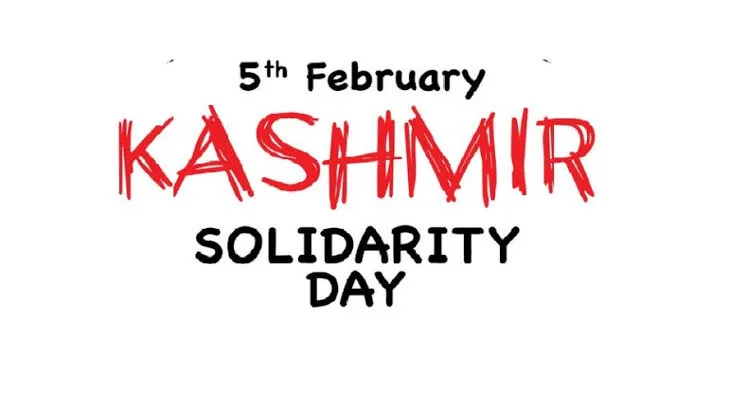In the face of persistent global and regional conflicts, exemplified by the longstanding Kashmir issue, Benjamin Franklin’s question resonates deeply: “When will mankind be convinced and agree to settle their difficulties by arbitration?” This question, poised by a visionary who played a pivotal role in the birth of the US, prompts contemplation of a future where disputes are resolved through dialogue rather than discord. Perhaps, within this same question lies a simple yet profound answer: a shift in the distribution of power among individuals and nations.
The crux of the matter may be found in a paradigm where power is so evenly dispersed that abuse becomes an implausible concept. It is a vision where personal and national sovereignty is unequivocally honoured, laying the groundwork for a world where conflicts find resolution through respectful arbitration. On this Day of Solidarity with the people of Kashmir, it is crucial to reflect through the annals of history, tracing the complicated dynamics that define the Kashmir issue.
The origins of this longstanding conflict begin with the partition of British-India in 1947, and the unfair accession of Kashmir to India by Lord Mountbatten, laying the groundwork for a dispute that has endured for decades. The divergent perspectives surrounding the region have intensified with the passage of time, leading to a complex interplay of historical events and geopolitical considerations. More recently, the Indian abrogation of Article 370 on 5 August 2019, marked yet another critical moment in the long history of Indian atrocities on the people of the valley. This move, once again, altered the landscape of the conflict, significantly impacting the autonomy of the region and the lives of the people. Since then, the people of the Illegally Indian Occupied Kashmir (IIOK) have been living in a state of constant crises and atrocities at the hands of Indian authorities.
The substantial deployment of more than 900,000 Indian troops in the region, alongside their influence over local law enforcement in IIOK, poses a momentous challenge to the inhabitants of IIOK. To conceal its human rights violations, the Indian authorities have resorted to extreme measures, including the suspension of communication services and the imposition of restrictions on foreign journalists from entering the IIOK region. Indian security forces are also exploiting draconian laws such as the Armed Forces Special Powers Act (AFSPA) and the Public Safety Act (PSA) to carry out arbitrary arrests with due cause. Under the Modi regime, these oppressive tactics have escalated, manifesting to plans to bring about demographic changes in IIOK.
India has amended laws to permit its citizens to purchase land in the region, issued domicile certificates to over 80,000 nonKashmiris, and facilitated the registration of almost 2.5 million new non-local voters. Additionally, the regime has deployed RSS-BJP volunteers to occupy Kashmir permanently, further exacerbating the situation.
Despite facing regular use of force, including pellet guns, the resilient Kashmiris have intensified their struggle for liberation as defined under international law. Much like the birth of nations, where differing powers grappled for dominance and control, the Kashmir conflict encapsulates a struggle against imbalances that have persisted for decades.
The unwavering resistance of the people of the valley in the face of such overwhelming odds accentuates the apparent insurmountability of the disparities between Kashmir and India, reflecting the enduring struggle for autonomy in the region. India’s refusal to participate in any negotiations or engage in dialogue with either the People of Kashmir or Pakistan highlights their refusal to confront the ground realities. This unwillingness not only obstructs the potential for a peaceful resolution but also contributes to an environment of tension and mistrust in the region.
It also impedes the chances of cultivating mutual understanding, fostering cooperation, and achieving a lasting solution. Engaging in genuine negotiations provides an opportunity to address longstanding grievances, identify common ground, and progress towards a solution that respects the rights and aspirations of the Kashmiri people.
Unwillingness to partake in meaningful dialogue not only perpetuates the existing situation but also obstructs the potential for constructing a peaceful and prosperous future for the entire region. The international community, too, has a role in promoting and facilitating dialogue on Kashmir. Diplomatic endeavours aimed at fostering understanding and cooperation can contribute to de-escalating tensions and fostering an environment conducive to resolving the Kashmir conflict.
The reluctance to engage in dialogue not only jeopardises the potential for regional stability but also hampers the broader objective of promoting peace and security in South Asia. On this Day of Solidarity, let us not merely commemorate but contemplate.
The complexities of Kashmir demand a collective introspection, challenging us to redefine the contours of conflict resolution. In the silent echoes of history and the resolute resistance of the Kashmiri people, there lies an unspoken plea for a world where disputes find solace in dialogue, and the pursuit of justice transcends borders. In the corridors of diplomacy, amidst the clamour of conflicting narratives, the path forward beckons — a path paved with empathy, understanding, and a genuine commitment to dialogue.
Nidaa Shahid is a Senior Researcher at Centre for Aerospace and Security Studies Lahore.


